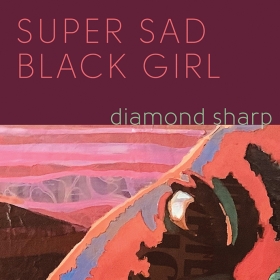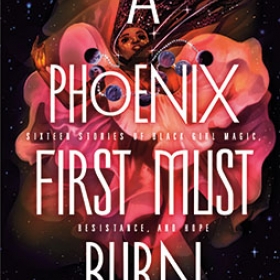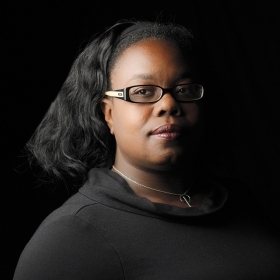Diamond Sharp ’11 knew from a pretty young age that she was going to be a writer. As a senior at Wellesley she began to write some of the poems in this debut volume, much of which deals with Sharp’s coming to terms with, and treating, her mental illness.

Diamond Sharp ’11
Super Sad Black Girl
Haymarket Books
72 pages, $17.00
Diamond Sharp ’11 knew from a pretty young age that she was going to be a writer. That ambition was supported by her mother and her grandparents, who enrolled her in programs to feed her muse. As a senior at Wellesley, she took a poetry workshop with Dan Chiasson, Lorraine C. Wang Professor of English, then went on to earn an M.F.A. from the Pratt Institute. That’s where she began to write some of the poems in this debut volume, much of which deals with Sharp’s coming to terms with, and treating, her mental illness.
This is your first book, and it contains some strong stuff—themes of anxiety, depression, even suicidal ideation. Can you talk about what you were going through when you wrote Super Sad Black Girl?
I was diagnosed with depression in 2012 and bipolar II disorder in 2013, but looking back on it, I can see that the signs presented themselves at least by my junior year of college. So by the time I started writing the book in earnest in my M.F.A. program in 2015, I had experienced bouts of depression, anxiety, and suicidal ideation to varying degrees.
I was especially interested in the line “my illness is an heirloom …” because it indicated you were not alone in this struggle. Can you talk about that?
I hospitalized myself three times between 2013 and 2015. For many people with mental health disorders, it’s typically a trial-and-error process to find a treatment plan that works for you, and it took a while for me to feel healthy again. One thing getting a formal diagnosis does is give you language and a new framework to understand behaviors [or] traits in your family. Getting the diagnosis allowed me to understand I wasn’t dealing with some fluke, but a long family history of fragile mental health.
In this book, you’ve given yourself some significant spirit-guides through your journey: Lorraine Hansberry, Gwendolyn Brooks, Margaret Walker. They are all Black Chicagoans, all women, all titans. What did you learn from them?
Chicago has a strong creative and activist culture that stands on the shoulders of the aforementioned and others. You can’t be a young Black child in the Chicago area with an interest in writing and not be introduced to their writing. In fact, l went to a middle school named for Gwendolyn Brooks—she was one of my earliest introductions to poetry. I’ve always felt an affinity for Hansberry because of her writing style and her strong political views. Walker was also an early introduction to poetry. What I learned from them was a model for a writerly life.
What would you like us to learn from you?
So, I wrote a very dark-humored book about living with bipolar disorder, because dark humor is how I live with it. I’d like others to know that living with bipolar disorder isn’t all doom and gloom. It’s a misunderstood disorder that even psych professionals learn more about every year. Even in moments of darkness there’s levity.
Bates is a correspondent for Code Switch, NPR’s team that covers race and identity.


